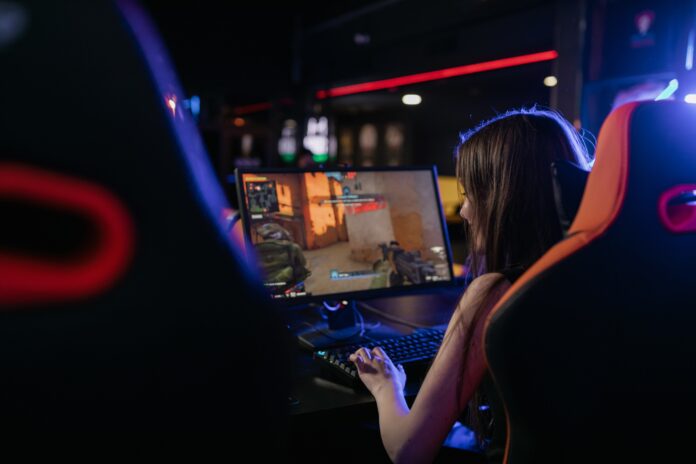
What progress has been made?
It is well-known that esports has traditionally been considered a male dominated industry, with videogames often targeted at a young male demographic. However, that is changing and progress is being made in the right direction. Lisa Manley, a FIFA player for the England’s eLionesses, is a great example of progress for women in esports. Recently she took part in a LAN tournament during a women’s esports bootcamp in Zurich, Switzerland which was organised by FIFA and the FIFA Museum. The bootcamp is a great promotional tool for women in esports. It exposes female players from around the world to a competitive stage where they can all compete against each other, learn and develop, which is not something that is always a given for women in the esports industry. Andrian Roelli, FIFA’s Head of eFootball, felt that given the number of women that we now see in gaming, it is important to ensure that they have a space to develop. The bigger picture is to create workshops around the goal of enhancing female talent and transitioning that into competitions on a larger scale
VALORANT, a game developed by Riot Games has also made leaping progress for women with the commencement of the VALORANT Champions Tour: Game Changers Championship, a women only league. With a $500,000 prize pool, the tournament had some of the biggest esports names competing, whilst becoming the most watched esports event featuring women in 2022.
Similarly, in March 2023, an all women Call of Duty league was founded by “Allycat”, a longstanding Call of Duty league caster and streamer. This was particularly significant given the male dominated reputation of Call of Duty. However, splitting women and men into separate leagues does not seem to be the only option. The new female “WxC” league was featured by Call of Duty where “Kelsaroony” was the first ever female Call of Duty player to qualify for the Call of Duty League Challengers Elite event, which usually sees only men compete. There is an argument that in the absence of physical characteristics necessitating division into separate men’s and women’s competitions (as is the case in most traditional sports), ultimately there should be no need for separate competitions based on gender, but in light of the current level of maturity of the industry, giving women their own platform is generally viewed as a positive development.
Current obstacles and how more women can get involved in esports
Although great progress has been made, there are still many obstacles for women in esports. For example whilst playing at a casual level in games such as Call of Duty and CS:GO it is not uncommon to encounter toxic behaviour towards women even in situations where the female players are outperforming the males on the same team. Female esports players have been speaking up about these issues in the last couple of years. Team Liquid’s Alixxa has spoken about her experience after playing in an all-female Fortnite tournament where the integrity of the entire tournament was questioned because it was all-female. Whilst talking about male player behaviour in games in general, Alixxa states that “the number of times I’ve seen women getting harassed by teammates, simply because they’re a girl, is horrifying,” and the “action taken against them for expressing hate and sexism is slim to none.”
Fortnite’s initiative to host all-female tournaments is encouraging and a step in the right direction. However, Alixxa’s testimony demonstrates the importance of promoting more women in esports, a responsibility which lies in the hands of the larger organisations and esports teams. The hope is that more female role models will encourage more diversity in the industry and will likely educate and improve this toxic behaviour that some players express towards women.
Fortunately, now there are a growing number of opportunities for women to get involved in esports. As mentioned, there are many bootcamps and women’s only tournaments hosted by various organisations depending on the video game and competition. Some organisations and video games provide exclusive spots for women in competitions, for example F1 has created the F1 Esports Series Women’s Wildcard which guarantees at least one female player competing at the highest levels.
Becoming a professional esports player is not the only option available for women hoping to enter this sector. There are a myriad of opportunities for women aside from gaming itself, including streaming, coaching, casting, presenting and interviewing. A great example of this, is a well-known on-stage presenter, esports journalist and influencer Eefje “Sjokz” Depoortere. As a child she grew up on video games starting on a legacy console before upgrading to a PC bought by her parents. At university she studied sports journalism, where coincidentally she came across League of Legends (“LoL”), which now offers one of the largest esports platforms in the world with competitions in six continents and millions of people watching. Sjokz combined her journalistic skills and passion for games and began interviewing esports players in LoL. She has grown to become the host of the LoL European Championship series and anchors packed stadiums all over the world during large LoL competitions. She is also a global brand ambassador for Mastercard, and a global sponsor of LoL esports events.
Sjokz now appears weekly in front of millions of viewers both online and in-person where plenty of female esports fans can see her. She is hoping that her career can promote more female talent and encourage women to be involved in esports:
“If you’re never going to see anyone like you on the big stage, why would you ever dream you could be able to?” – Sjokz
In conclusion, over the last decade esports has boomed, and so has the interest from women in the industry. We are seeing many large organisations such as FIFA, Formula 1, Riot Games and various videogame companies recognising the importance of driving the industry forward and encouraging women to get involved, whilst trying to harness and develop female talent. However, being a professional player is not the only route into the industry, there is a huge variety of exciting opportunities women can get involved in whilst being from different backgrounds and having different skills. All that we can say is that esports, and women’s role in this industry, will only grow from here and it is definitely a space to watch!
To find out more about our capabilities and experience in Women’s Sport, please visit our Sports Law+ site.









